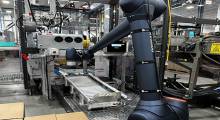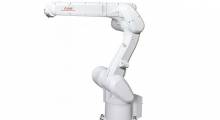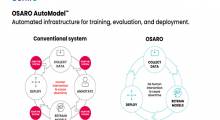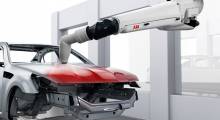It appears nearly every tech and auto giant are now evaluating autonomous vehicle technology.
Google-owner Alphabet recently spun out its self-driving car unit, Waymo, into its own subsidiary.
Apple was just granted a license in California to test autonomous vehicles.
Ford and General Motors are also doubling down on creating autonomous vehicles.
Now Amazon could be eyeing driverless car technology as a way to get items to people's doors faster, according to a new report from the Wall Street Journal.
“Amazon.com Inc. has created a team focused on driverless-vehicle technology to help navigate the retail giant’s role in the shake-up of transportation, according to people briefed on the matter.”
The initiative, still in its early phases, could help the Seattle-based company overcome one of its biggest logistical complications and costs: delivering packages quickly.
Amazon could use autonomous vehicles including trucks, forklifts and drones to move goods.
In addition, driverless cars could play a broader role in the future of last-mile delivery, enabling easier package drop-offs, experts say.

Amazon was awarded a patent for a network that manages a very specific aspect of the self-driving experience: How autonomous cars navigate reversible lanes.
According to Fortune magazine, Amazon's ambitions, however, may not be to actually build these cars.
Instead, the e-commerce giant has a team of around a dozen employees thinking of ways to potentially use the nascent technology to expand its own retail and logistics operations.
Read: Fighting Amazon’s Supply Chain Takeover
Operating fleets of driverless trucks to ship items bought from its marketplace could help lower costs for the company.
Amazon spends billions of dollars each quarter on shipping, and these costs continue to rise as the company aims to deliver everything from toiletries to TVs to customers around the world in two days or less.
During the past two years, Amazon has been looking to take over more shipping duties from the likes of UPS and FedEx by leasing trucks, planes, and ships.
The company has also started testing drones to deliver items from warehouses to buyers' doorsteps as part of its Prime Air initiative.
Earlier this year, Amazon was awarded a patent for the technology that would allow driverless cars to to navigate traffic and lanes on highways.
Related: FedEx Bets on Automation as it Prepares to Fend Off Uber and Amazon
Related “Delivery” White Papers
Five Ways to Optimize Your DC For E-Commerce Fulfillment
While DCs typically are designed to handle below-peak throughput, the rise of e-commerce, more frequent promotions and competitive service level agreements are creating more peak periods than ever. Download Now!
Drivers and Enablers for Moving Ahead of the Competition
The process of final delivery has been disrupted by the creation of omnichannel operations, through competition, endless aisle, and same-day/next-day delivery, the final delivery services are not new to consumers, and the direct-to-consumer B2C and B2B delivery model is already established for other industries. Download Now!
Amazon’s Move into Delivery Logistics
Many industry players and experts are waiting anxiously to see what innovations Amazon will come up with next – and above all, whether Amazon will enter into delivery logistics under its own banner. Download Now!
Home Delivery and Same-Day Delivery for Retailers
Retailers are struggling to respond to the new threat of online giants like Amazon, who are siphoning off the customers of traditional retailers, what is driving this and what can retailers do to retaliate against this threat? Download Now!
Technological Disruption and Innovation in Last-Mile Delivery
Technology is driving a heightened level of innovation in product and service offerings in the last mile parcel delivery market, and is transforming the way delivery providers interact with their customers, this paper examines these technologies and business models. Download Now!
Adding Value to Parcel Delivery
Digitally connected consumers, looking for lower prices, greater convenience and a seamless experience when buying, receiving and returning products, are forcing post and parcel companies to rethink traditional parcel delivery. Download Now!
Building the Smarter Warehouse: Warehousing 2020
Redefining Supply Chain Automation in the Age of Digital Technology: This online survey asked IT and operations personnel in the manufacturing, retail, transportation and wholesale market segments to share their insights and business plans over the next five years, in light of a rapidly changing industry. Download Now!
Article topics
Email Sign Up

























